Roberto Tovar is empowering people living with HIV
Roberto Tovar, 36, also discusses setting up a platform for people living with HIV in the UK’s Latin American community.
I was diagnosed with HIV in 2014. After that, I realised I didn’t really know much about it, and I could feel a sense of detachment from it in my community. Although the situation has improved when it comes to treatment and life expectancy, people do still die, which I think can get forgotten sometimes.
Not long after my positive result, someone sent me a video of a person named Wyndham Mead from Berlin where they explained their journey with HIV. In a moment when I wasn’t sure what was going to happen to me, I found it comforting. I knew I wanted to do something similar.
I moved from Mexico City to London in 2016 and, two years later, started a personal project called Número de Serie, a sexual and mental health awareness platform with a focus on reducing stigma around HIV in the Latin American community in the UK.
The Latinx community in the UK is huge, with more than 250,000 registered people, but we estimate that we number more than 400,000. Currently, ‘Latinx’ is not a recognised ethnicity in the majority of government or medical records. We are recorded as ‘Other’ and if we cannot be counted, funds and initiatives to tackle inequality won’t get to us. Access to healthcare for my community tends to rely on the private or charitable sector. That’s why I want to make sure that there are Latinx voices and faces in the HIV discourse in the UK and to reach out to other Latinxs in your readership: let’s connect!
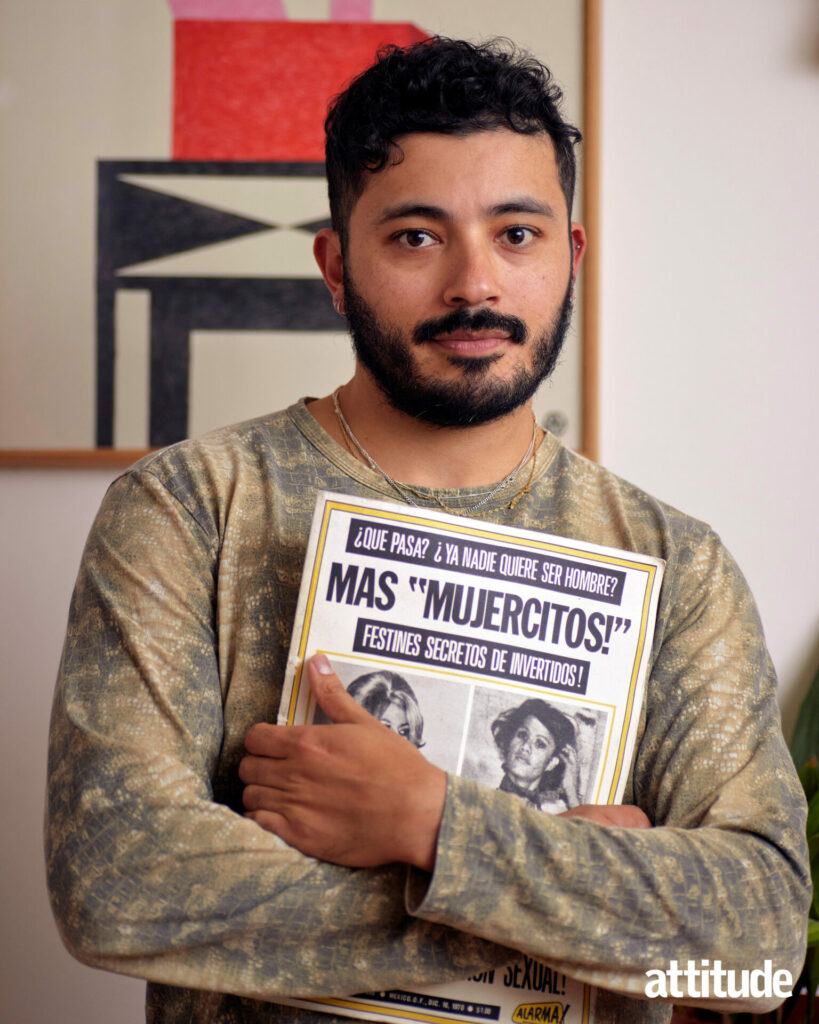
Last year, as part of Public Health England’s Innovation Fund and in partnership with METRO Charity and the NAZ project in London, I directed a series of short films about five Latinx people living with HIV in the UK. I wanted to put a face on it and show people how we look and what we do. It features the first non-binary person in UK history to be granted refugee status, Arthur Britney from El Salvador. The diversity of stories, backgrounds, and resilience that we as migrants and HIV-positive people have developed is inspiring. You can watch the films at mymessagetoyou.info.
This year, I’m teaming up with METRO and NAZ again to develop and deliver a programme about internalised HIV stigma — how to identify it, tackle it, and empower people living with HIV. We want to build a support system for them and create language-specific resources to be used within their own networks.
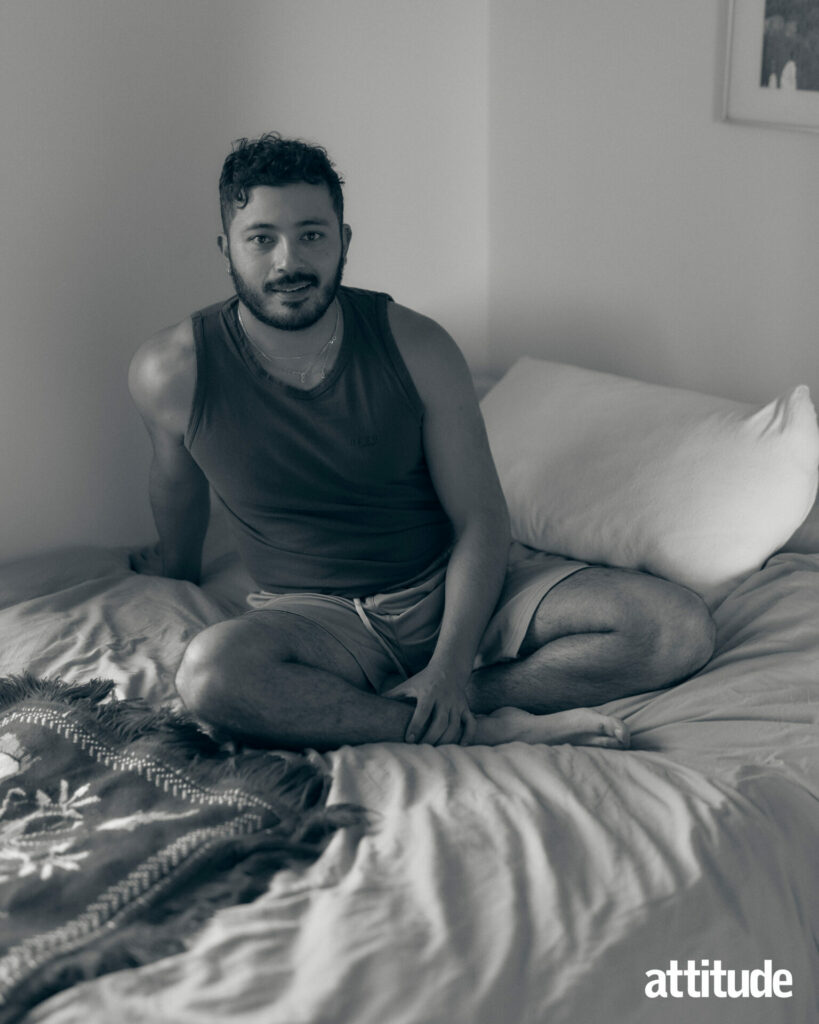
We grow up absorbing all these terrible thoughts about HIV. Outdated stereotypes, concepts, and harmful media representation can all lead to feelings of isolation, shame, guilt, low self-esteem, or a sense of being unlovable. Recently, I was thinking, ‘Am I not hooking up because my status is public in my Grindr/Scruff?’ That doubt is internalised stigma.
Unfortunately, I have experienced stigma as a result of living with HIV — both external and internalised. I’ve had dentists refuse to see me, I’ve had judgemental comments from nurses, and, of course, from guys when I’ve been about to hook up with them. Some have gone “Yeah, I know about U=U, but I can’t do it” or the classic “Are you clean?” I’ve been living with HIV for eight years and in that time, I’ve grown a thicker skin to deal with situations like these. I understand we all have different upbringings and access to information, so I try to be empathetic.
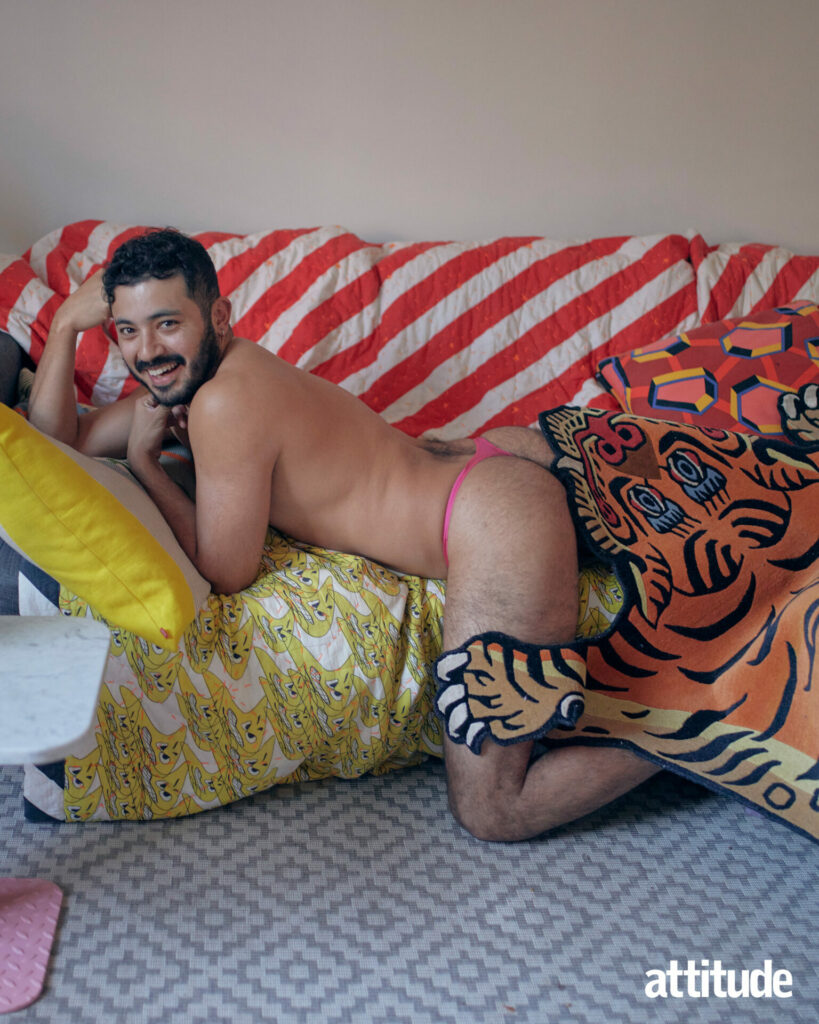
Medically, we have come a long way from the 80s and we know now that people on effective treatment cannot transmit HIV to other people, that Undetectable equals Untransmittable is a reality. We need to shout that message from the rooftops!
My diagnosis put things into perspective when it came to my body. It made me feel vulnerable and because of that I became more aware of my health. I do a mixture of gym, CrossFit, and I cycle every day. It helps me to manage stress and anxiety.
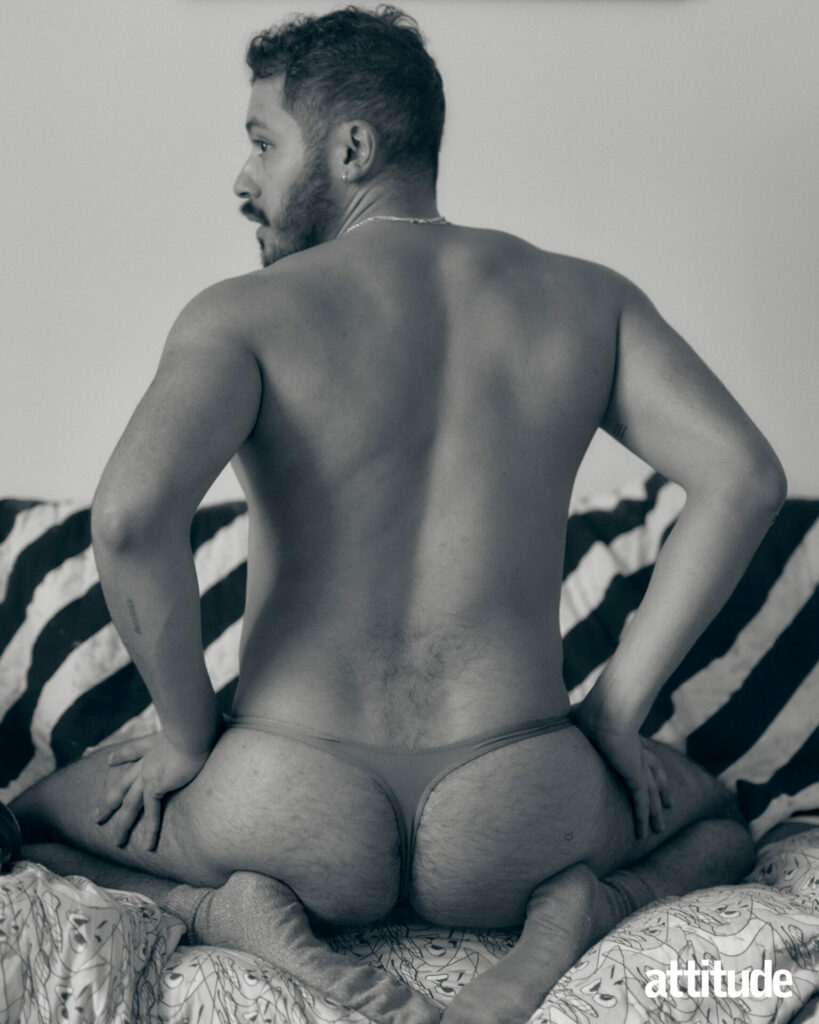
To me, my body is a complex, temperamental machine and walking laboratory. It represents the work of people who have come before us so that I can be here now. It also represents advances that have been made in medicine and in social attitudes. If antiretroviral therapy wasn’t a thing, I wouldn’t be here today, but it’s not only about keeping the body alive, but also keeping the mind moving forward as well.
I would describe the journey that I’ve been on with my body as like when you realise that you have been in love with your friend from primary school, but you didn’t know at first or you didn’t dare to say it to each other — then that declaration of love finally happens. We are in love now, mostly.
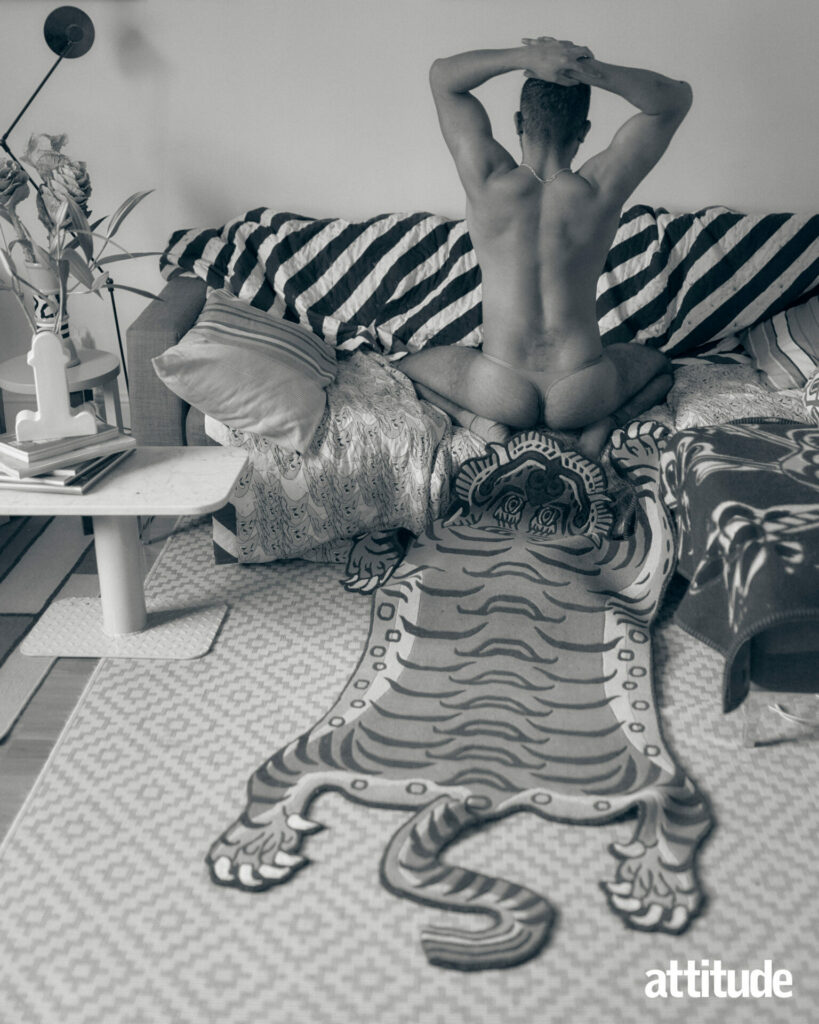
For a long time, I didn’t see significant changes in my body, which made me feel like I didn’t belong in any one group within the LGBTQ community. I was too skinny, too young, too hairy, not too hairy, not big enough, or whatever standards gay men decided to be the hot ticket at the time. But I would always fall for those standards even though I thought I was above that system of body hierarchies. I have other traits, like a sense of humour, my warmth and humbleness that I thought protected me. As time has gone by, I think I’ve been dropping those comparisons or worries about not belonging.
I remember one occasion I found quite liberating where I was at Cocktail d’Amore in Berlin. I was dancing so happily and freely, and I took my top off. I didn’t care about anybody around me, there was only me and the music. But a hot boy joined me. Before that I used to think, ‘I’m not the kind of guy who takes his top off at a party,’ but now, looking back, I think, ‘Why not?’ Because I’m not muscular enough? F*** that. If you are feeling yourself, and you want to take your top off, take it off! You do you. Small moments like that have a big impact on how you relate to your body. It’s called self-acceptance.
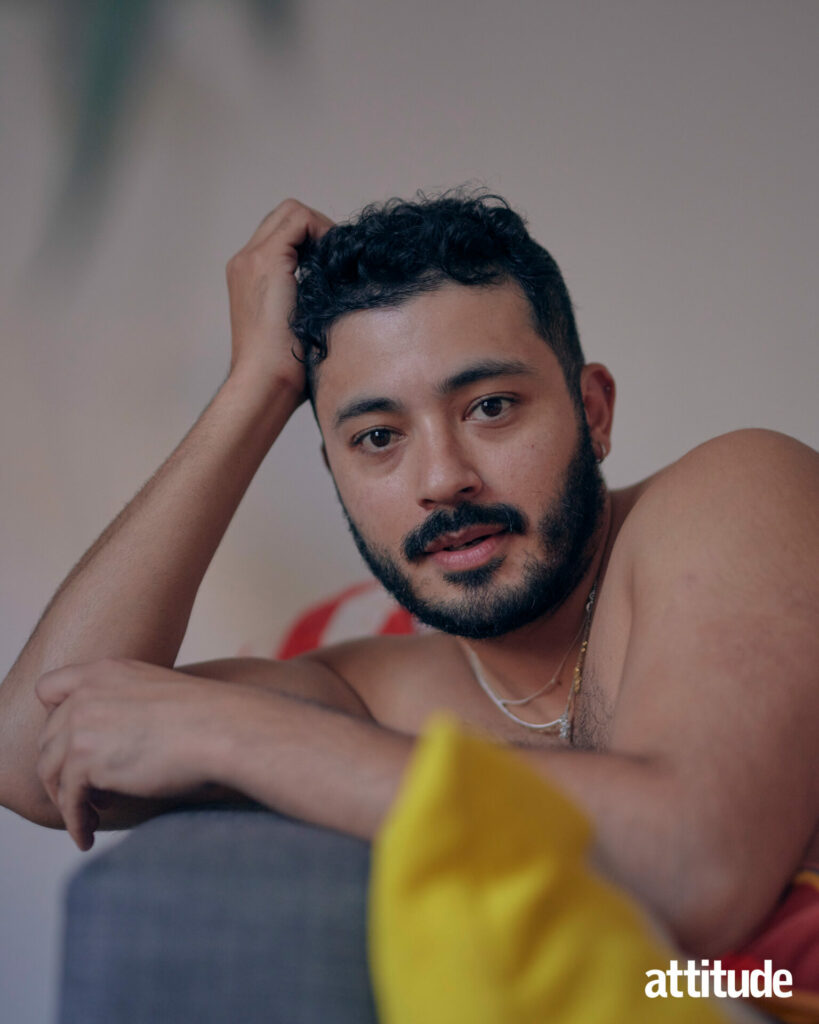
Therapy has helped me build that confidence. It’s the gift you should give to yourself at any point in life. Last year, after going through a breakup and appendicitis in the same month, my therapist recommended reading A New Earth by Eckhart Tolle and it really shook me. I thought: ‘I’ve been worrying about and overthinking the wrong stuff.’
I grew up in an area of Mexico City called Azcapotzalco in the north. It’s a very working-class neighbourhood. I used to hate it when I was growing up, but now I’m more nostalgic. When I was maybe six or seven, I was “helping” my mum to hang clothes to dry on the rooftop. I remember saying to her, “Mum, when I grow up, I want to live abroad, to go far away to one of those schools where you sleep in.” She replied, “Well, you should have been born into another family because it’s not gonna happen.” I don’t think she meant to discourage me but instead she wanted to put things into context and remind me of what our reality was in that moment. I don’t really know why I said that… I think it was whatever I was watching on TV, but I remember really early on wanting to get away. I wonder if it was related to me knowing I was gay from a very early age.
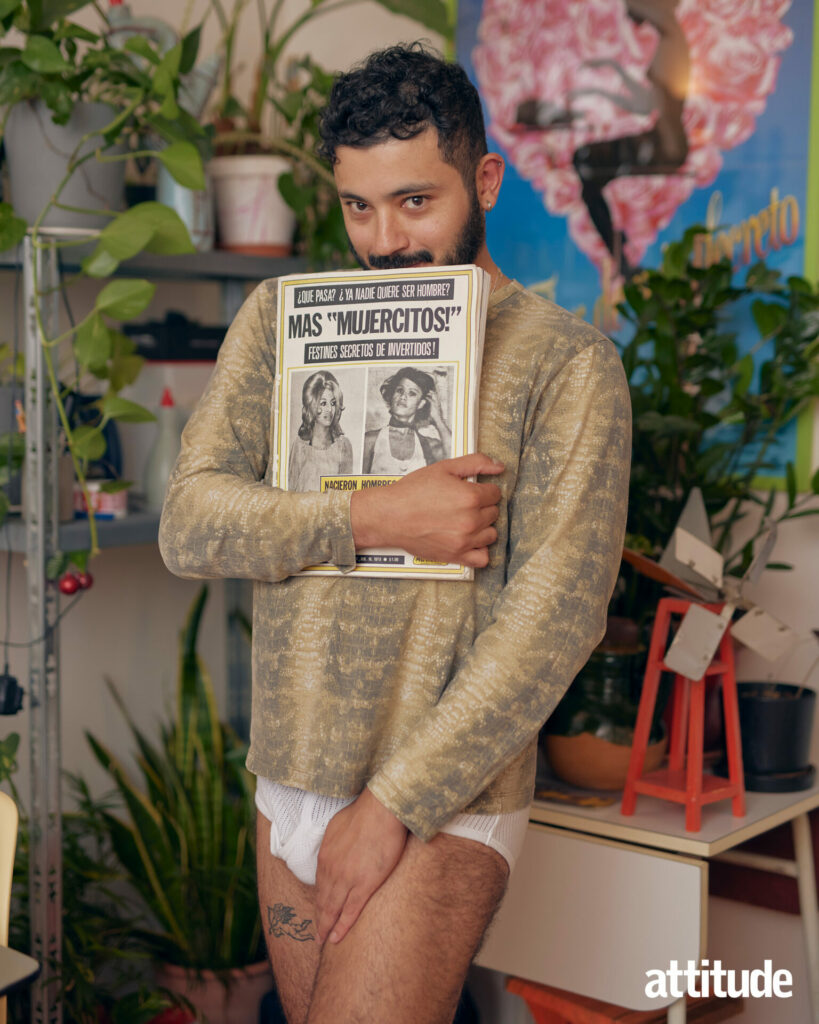
I don’t think I had a ‘proper’ coming out. I remember talking to my friend Paco and saying I thought I was bi, which somehow felt more ‘acceptable’ than being gay. Then I fell in love with a guy, and I told my family. My brother just said, “OK, cool!” and my sister was like, “No shit, Sherlock.” To my friends and family, I didn’t have to say anything. I just introduced them to people I was dating, so it went pretty smoothly, I’d say.
Growing up, school was a lot. I went from public to Catholic private school. I got recruited to be a priest, but my dad told me to reject the scholarship because I was gonna “become gay”. This was before I came out, too. I got bullied in secondary school and I walked out of school every day for a year until they called my mum in to tell her. That was one of the times when I knew she was really disappointed. She didn’t say anything on our way home, which hurt more. She passed away shortly after, and I don’t think she knew her son was being bullied.
If I could speak to my younger self, I’d tell them to cry more. I’d say, don’t hold back and tell the people you love that you love them more often. Also, drink more water, read more and be patient.
